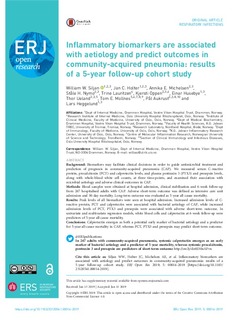| dc.contributor.author | Siljan, William Ward | |
| dc.contributor.author | Holter, Jan Cato | |
| dc.contributor.author | Michelsen, Annika | |
| dc.contributor.author | Nymo, Stig Haugset | |
| dc.contributor.author | Lauritzen, Trine | |
| dc.contributor.author | Oppen, Kjersti | |
| dc.contributor.author | Husebye, Einar | |
| dc.contributor.author | Ueland, Thor | |
| dc.contributor.author | Mollnes, Tom Eirik | |
| dc.contributor.author | Aukrust, Pål | |
| dc.contributor.author | Heggelund, Lars | |
| dc.date.accessioned | 2019-07-05T11:34:16Z | |
| dc.date.available | 2019-07-05T11:34:16Z | |
| dc.date.created | 2019-06-26T13:55:54Z | |
| dc.date.issued | 2019 | |
| dc.identifier.citation | ERS Monograph. 2019, 5 (1), 1-10. | nb_NO |
| dc.identifier.issn | 2312-508X | |
| dc.identifier.uri | http://hdl.handle.net/11250/2603636 | |
| dc.description.abstract | Background Biomarkers may facilitate clinical decisions in order to guide antimicrobial treatment and prediction of prognosis in community-acquired pneumonia (CAP). We measured serum C-reactive protein, procalcitonin (PCT) and calprotectin levels, and plasma pentraxin 3 (PTX3) and presepsin levels, along with whole-blood white cell counts, at three time-points, and examined their association with microbial aetiology and adverse clinical outcomes in CAP.
Methods Blood samples were obtained at hospital admission, clinical stabilisation and 6-week follow-up from 267 hospitalised adults with CAP. Adverse short-term outcome was defined as intensive care unit admission and 30-day mortality. Long-term outcome was evaluated as 5-year all-cause mortality.
Results Peak levels of all biomarkers were seen at hospital admission. Increased admission levels of C-reactive protein, PCT and calprotectin were associated with bacterial aetiology of CAP, while increased admission levels of PCT, PTX3 and presepsin were associated with adverse short-term outcome. In univariate and multivariate regression models, white blood cells and calprotectin at 6-week follow-up were predictors of 5-year all-cause mortality.
Conclusions Calprotectin emerges as both a potential early marker of bacterial aetiology and a predictor for 5-year all-cause mortality in CAP, whereas PCT, PTX3 and presepsin may predict short-term outcome. | nb_NO |
| dc.language.iso | eng | nb_NO |
| dc.publisher | European Respiratory Society | nb_NO |
| dc.rights | Navngivelse-Ikkekommersiell 4.0 Internasjonal | * |
| dc.rights.uri | http://creativecommons.org/licenses/by-nc/4.0/deed.no | * |
| dc.title | Inflammatory biomarkers are associated with aetiology and predict outcomes in community-acquired pneumonia: Results of a 5-year follow-up cohort study | nb_NO |
| dc.type | Journal article | nb_NO |
| dc.type | Peer reviewed | nb_NO |
| dc.description.version | publishedVersion | nb_NO |
| dc.source.pagenumber | 1-10 | nb_NO |
| dc.source.volume | 5 | nb_NO |
| dc.source.journal | ERS Monograph | nb_NO |
| dc.source.issue | 1 | nb_NO |
| dc.identifier.doi | 10.1183/23120541.00014-2019 | |
| dc.identifier.cristin | 1708047 | |
| dc.description.localcode | Copyright © ERS 2019. This article is open access and distributed under the terms of the Creative Commons Attribution Non-Commercial Licence 4.0. | nb_NO |
| cristin.unitcode | 194,65,15,0 | |
| cristin.unitname | Institutt for klinisk og molekylær medisin | |
| cristin.ispublished | true | |
| cristin.fulltext | original | |
| cristin.qualitycode | 1 | |

